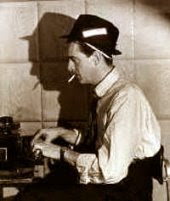A man leaves the front of the courthouse. He holds a jumper awkwardly over his head, his hands cuffed together. He navigates the steps carefully with the aid of two Gardaí and bends his head cautiously as he climbs into the car, probably never to be seen again, more than likely never to be recognised again.
Guilty until proven innocent or innocent until proven guilty?
Ireland and America are of two very different mindsets when it comes to the procedure of a court hearing. In Ireland we hand the suspect a newspaper to cover their face with, we make sure they are well-hidden so nobody gets the prizewinning photograph to adorn the front pages of the newspapers in the morning. We know the suspect by name but, unless we catch a glimpse of them in the beginning, we are left to wonder as to what murder suspect or suspected paedophile looks like.
In America the suspect leaves the court in full view of everybody, the press and public included. There is a walk of shame to the car; the head hangs low, the eyes are nervous to meet with anyone else’s. In Ireland there is an almost arrogant swagger from the courthouse, “Ha! You know, I might have been charged, but hell, you still can’t see me”.
If you commit a crime so bad you have a court appearance of media interest, you should have to experience the shame that goes with it. A loss of dignity however, I hear you say. I am of the belief you have lost your dignity the minute you stand up in court.
The Courts Service has a press release on the newly-built Criminal Court of Justice in Dublin. It is such designed so it is the first courthouse in the world that keeps the contact between the families of homicide victims and the accused and their families to a minimum. It also brings “an end to the indignity of persons being paraded in public in handcuffs”.
Why should we respect a citizen’s right to privacy if they have snatched another citizen’s right to safety, privacy, or even worse, their right to life? Would it not be better to see the child paedophile ring leader’s face so you are able to recognise him if you notice a strange man wandering suspiciously around a children’s playground in three or four year’s time? How about our own right to safety?
Away with the newspapers, jackets and arrogant swaggers I say, let the country see the shame on your face. Let the nation plaster your face on the front of the newspapers and let them know your crime. Let people see the look on your face after you sat there in court and witnessed the expressions on the victim or their families. The rape victim who has lost all confidence, all dignity, all sanity, or the family of the murder victim who will never see their son again and lie in fear at night, images of his last few minutes, how he died, his death, running ferociously through their tired and weary minds.
Why should we cater for the privacy of criminals? A crime is on record for life; perhaps if we make the sentence as tough as possible, with no silly games of hide and seek, our country’s criminals might take a second thought in future before committing the crime.
DC


This really is a tough debate to settle as there are so many different ways of looking at it.
ReplyDeleteOn one hand, by not allowing photographs of people on their way in and out of court, we can protect the reputation of an innocent person who is wrongly accused.
While some people want to stay as far away from the press as possible, we have all seen the pictures of gang members, particularly here in Limerick, giving the middle finger to the photographers as they laugh and smile, pleased with their performances in court and looking forward to their spell behind bars.
Let's stop making celebrities out of gang members.
NT